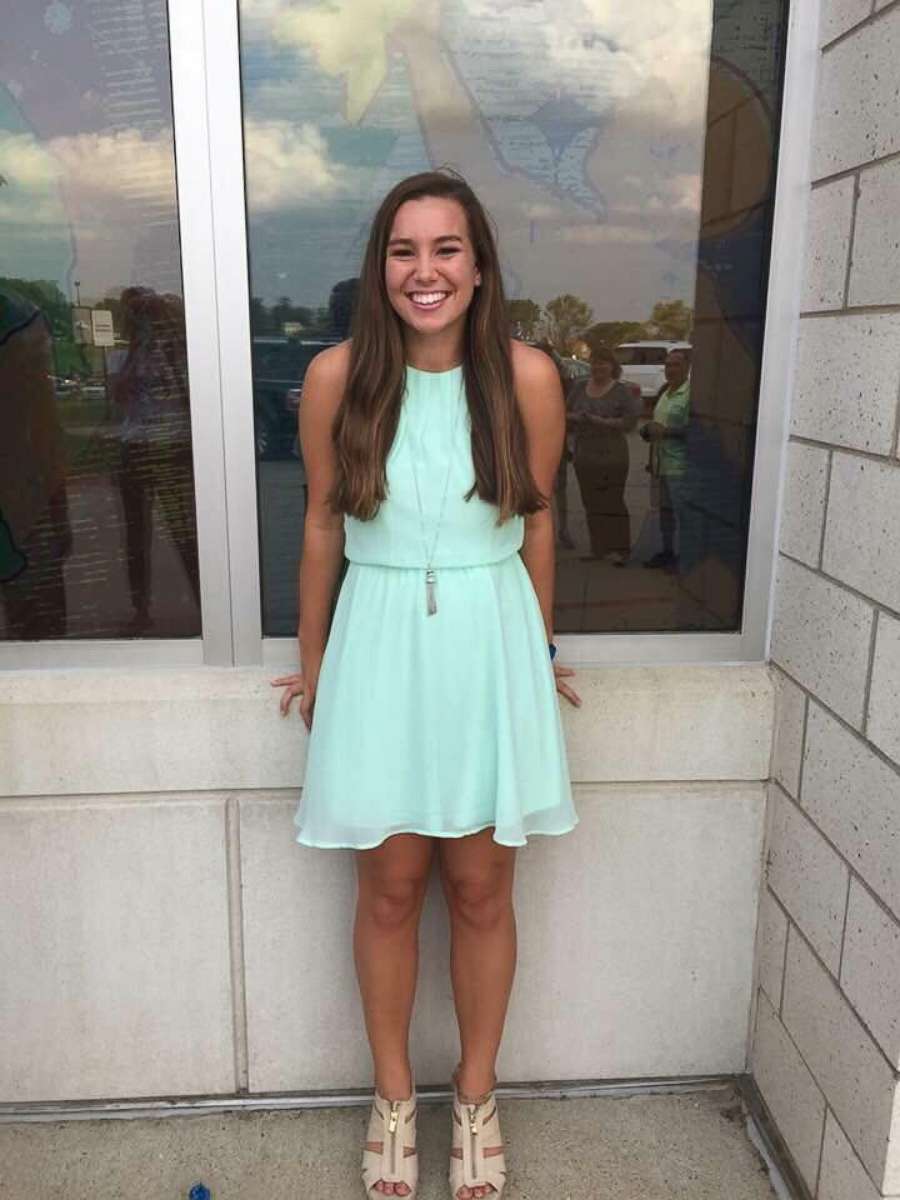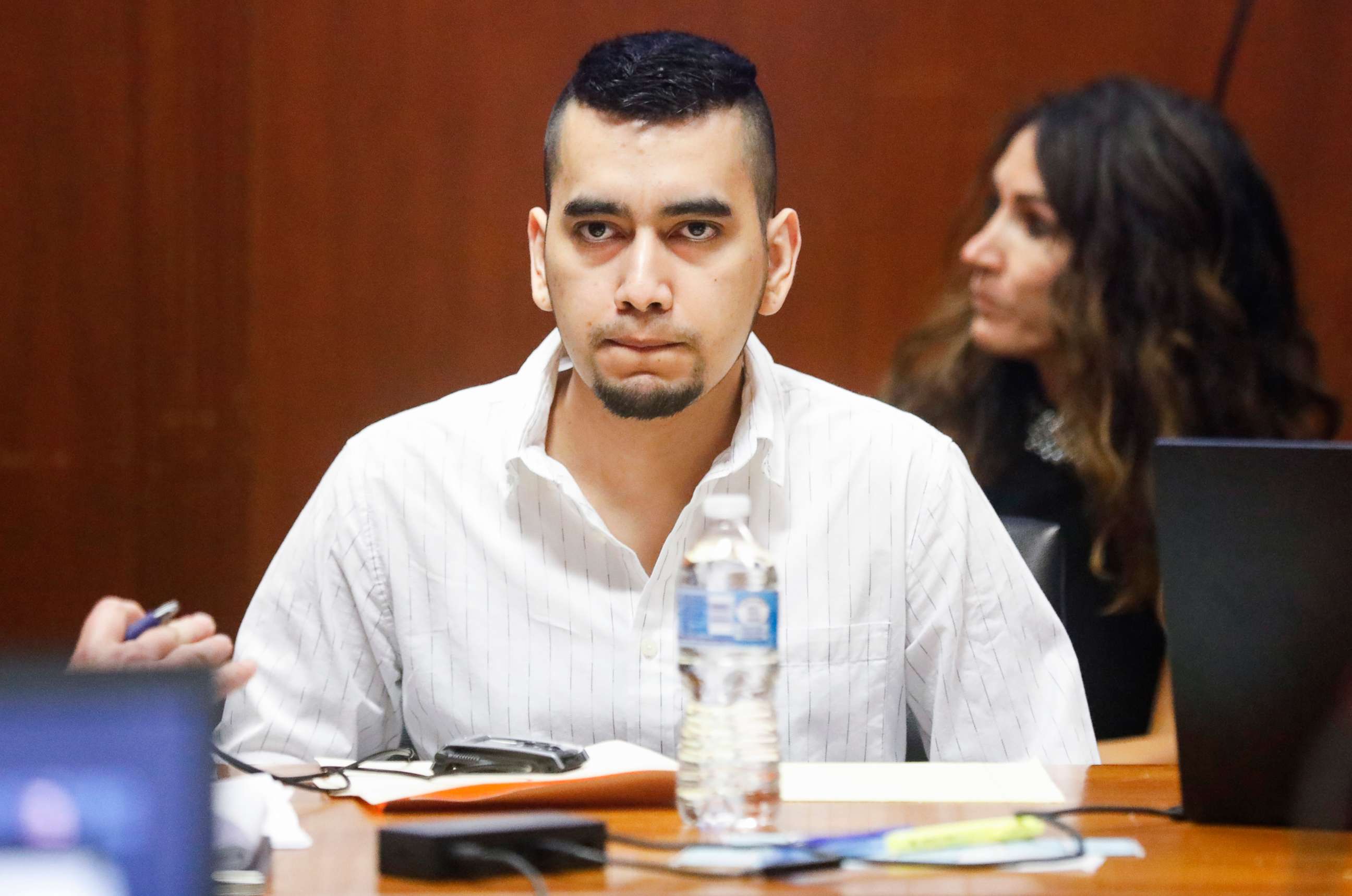Key takeaways from trial of Iowa farmworker charged with Mollie Tibbetts' murder
"I wholeheartedly believe he's guilty," Tibbetts' boyfriend testified.
The trial in a murder case that rocked the American Heartland began on Wednesday with a prosecutor telling an Iowa jury that the evidence will show that farmworker Cristhian Bahena Rivera, a Mexican national, abducted University of Iowa student Mollie Tibbetts while she was jogging, stabbed her seven to 12 times and dumped her body in a cornfield.
In his opening statement to the predominantly white Scott County jury of eight women and seven men, prosecutor Bart Klaver asked the panel to focus on three things: the defendant's car was captured on security video circling the 20-year-old Tibbetts around the time she vanished in 2018, her blood was discovered in the trunk of his vehicle, and his own statements to investigators implicated him.
"Ladies and gentlemen, when you examine the evidence together, there can be no other conclusion than the defendant killed Mollie Tibbets," Klaver said.
In an unusual move, Bahena Rivera's attorneys deferred giving an opening statement until the state concludes its case.

Bahena Rivera, an undocumented immigrant who speaks little English, sat in the Davenport courtroom dressed in a white shirt and dark slacks with headphones on to listen to the trial with the aid of a Spanish interpreter. He pleaded not guilty to first-degree murder.
The high-profile trial was moved to Scott County from Poweshiek County due to the enormous pre-trial publicity, including statements from former President Donald Trump, who alleged that Bahena Rivera was an example of a broken immigration system.
Rivera came to the U.S. illegally, according to officials, and allegedly provided false forms of ID that were verified through the Social Security Administration's verification system, according to his employer.
Tibbetts' boyfriend admits to affair
Defense lawyer Chad Frese, who's defending Bahena Rivera with help from his wife, attorney Jennifer Frese, immediately attempted to undermine the state's case with a blistering cross-examination of the prosecution's second witness -- Tibbett's live-in boyfriend, Dalton Jack.
Frese seemed to portray Jack, who enlisted in the U.S. Army about three months after Tibbett's badly decomposed body was discovered, as the villain in the case, a possible suspect. Prosecutors maintain that Jack has an ironclad alibi: He was about 140 miles away working on a Mississippi River bridge construction project in Dubuque, Iowa, on the evening of July 18, 2018, when Tibbetts disappeared from a country road in their hometown of Brooklyn, in Poweshiek County.
Frese began his questioning by getting the 22-year-old Jack to confirm that Tibbetts, whom he began dating in high school, was the love of his life and that he'd hoped to marry her.
Over repeated objections from prosecutors, Frese got Jack to admit that he had cheated on Tibbetts, and that Tibbetts had learned he had strayed from the woman he was having an affair with, and that she confirmed it by going through his phone and finding messages to her.

Jack testified that he initially withheld the information about the affair from law enforcement investigators, who, at the time, were searching for Tibbetts.
"I didn't deem it necessary," he said. "I didn't think it was pertinent to the case."
Jack also testified that he and Tibbetts had an argument over his infidelity three days before she disappeared and that they had discussed breaking up about a month earlier.
He testified that while he wants Bahena Rivera to be convicted of killing Tibbetts, he did not want to take the witness stand in the trial.
"I didn't want to be in the same room as your defendant here," he said, staring at Bahena Rivera seated at the defense table.
Under follow-up questioning from prosecutor Scott Brown, Jack testified that he's been cooperating with the prosecution in preparation for the trial, even while deployed to Iraq.
Asked by Brown why he initially was apprehensive about testifying, Jack said of Bahena Rivera, "I'm obviously not his biggest fan," adding, "I wholeheartedly believe he's guilty."
Frese informed Judge Joel Yates that he plans to call Jack back to the witness stand when the defense presents its case in the trial, which is scheduled to last about 10 days.
Avid runner
Klaver began his opening statement by telling the jury that Tibbetts was 19 at the time of her death and was preparing to enter her sophomore year at the University of Iowa, where she was studying child psychology. He said that at the time of her death, Tibbetts was working at a child daycare center in Grinnell, Iowa.
"Mollie was an avid runner, and she ran cross country and track in high school," Klaver said. "On July 18, 2018, she put on her multi-colored, neon running shoes and left the house."
He said she was spotted running on a gravel road on the outskirts of Brooklyn by her hairstylist, Kristina Steward, who drove by Tibbetts.
"Aside from Mollie's killer, Kristina Steward was the last person to see Mollie alive," Klaver said.
Tibbetts' disappearance prompted a massive search, involving hundreds of police and volunteers, the FBI and the Department of Homeland Security.
"After four weeks, they were no closer to finding Mollie than when they started," Klaver added.
It wasn't until investigators combing through security video found footage of Tibbetts jogging and noticed a black Chevrolet Malibu driving past her repeatedly. He said the vehicle was noticeable because it had chrome door handles and mirrors.
He said a Poweshiek County sheriff's deputy driving home spotted a vehicle matching the description of the Malibu, followed it and spoke to the driver, Bahena Rivera. That deputy photographed Bahena Rivera and the vehicle.
Alleged confession
On Aug. 20, 2018, investigators interviewed Bahena Rivera, who worked at a dairy near Brooklyn, for several hours at the Poweshiek County Sheriff's Office.
Klaver said that at first Bahena Rivera denied knowing anything about Tibbetts' disappearance other than what he saw in news reports and missing-person flyers. But when confronted with a still image of his car from security video taken around the time Tibbetts went missing and near where she was jogging, Bahena Rivera allegedly changed his story.
"It was then that the defendant relented on his story and he admitted that he had seen Mollie the night she disappeared, that he wanted to get close to her," Klaver said. "He admitted that he found her attractive, that she was 'hot,' in his words."
Klaver said that on Aug. 21, 2018, Bahena Rivera led police to a cornfield outside Brooklyn, where he made a confession.
The prosecutor alleged that Bahena Rivera parked his car, got out and started jogging alongside Tibbetts, who threatened to call the police.
"He admitted that he became angry at that time. He admitted to fighting with her," Klaver said. "And then he says the next thing is, he's driving in his car, the Malibu, and he notices Mollie's earbud [in his lap] and he remembers that Mollie is in his trunk."
Klaver said Bahena Rivera allegedly confessed to driving to the cornfield, opening the trunk and seeing Tibbetts' lifeless body with blood around her head and neck.
"He admits putting Mollie over his shoulder. He described the body as someone who had fainted," Klaver said. "He admitted taking Mollie into the field, placing her face up and putting cornstalks on her body and then leaving."
Klaver said police searched the field and found Tibbetts' body "decomposed beyond all recognition, wearing multi-colored neon running shoes."
An autopsy, Klaver said, determined that Tibbetts was stabbed seven to 12 times in the chest near her ribs, neck and skull.
"I'll ask you to return a verdict, the only verdict that the evidence demands," Klaver told the jury, "guilty of murder in the first degree."




